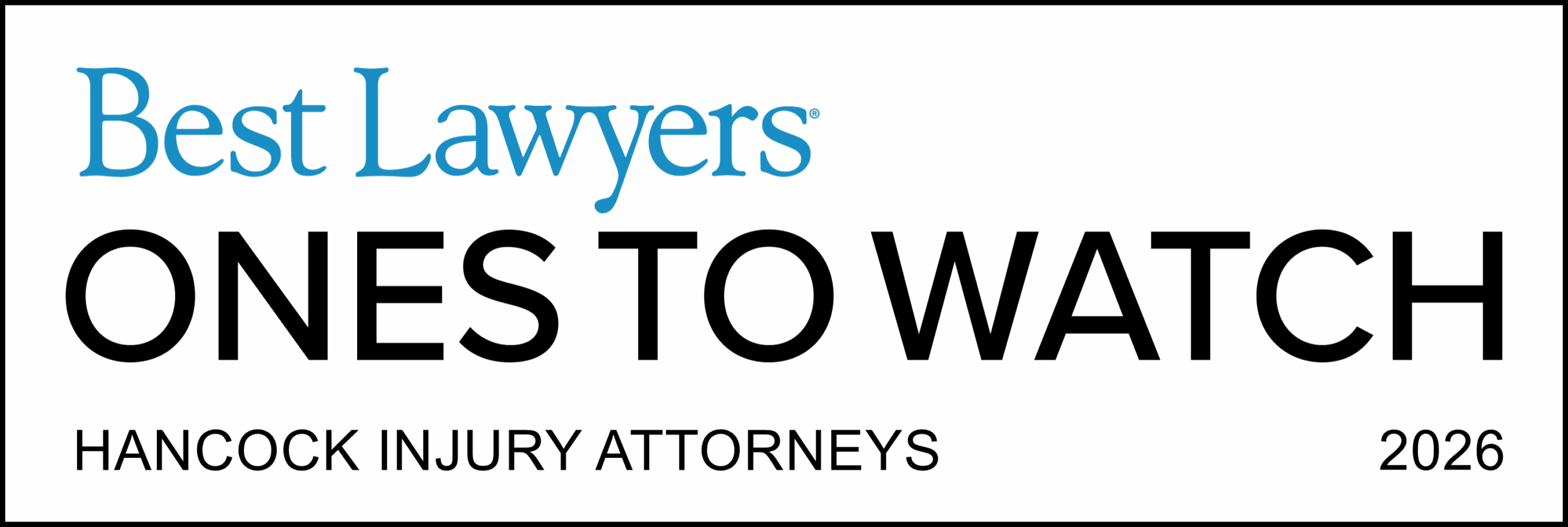Let Us Help You In Your Florida Personal Injury Case
Accidents and injuries can happen in the blink of an eye, leaving you with physical, emotional, and financial burdens. When the unexpected occurs in the vibrant city of Tampa, Florida, having the right legal guidance can make all the difference in your journey to recovery.
At Hancock Injury Attorneys, we understand the challenges you face after an accident. The mission at our law firm is to be your unwavering advocates, ensuring that you receive the justice and compensation you deserve. Whether it's a car accident, slip and fall, medical malpractice, or any other personal injury case, we're here to help you navigate the complex legal terrain with compassion, expertise, and determination. Talk to one of our Tampa personal injury lawyers today. Call us at (813) 915-1110 for your free consultation.
Choose Hancock Injury Attorneys
Why Consider Our Personal Injury Law Firm To Represent You
When you find yourself facing the aftermath of an injury, our experienced Tampa personal injury attorneys are here to guide you through the legal process, giving you the peace of mind to focus on your recovery. You will benefit from:
Client-First Experience:
From your first call with us, you will always have helpful and productive interactions with Hancock Injury Attorney team members.
We know that not one size fits all for personal injury cases, and will always do what is in the best interest of you, our client
Clear & Timely Communication:
Throughout your case, we will update you regularly with easy-to-understand and transparent conversations.
You will never feel like you don’t know what is going on with your car accident or other personal injury case.
Meaningful Results:
Results mean more than money. While we have a track record of getting the best results possible for our clients, we also want to ensure our clients are getting results from their medical care, for their transportation needs, and provide an overall experience that is as stress-free as possible.
With our extensive knowledge of Florida's legal landscape and a commitment to upholding your rights, Hancock Injury Attorneys is your trusted partner in seeking justice. We're ready to stand by your side, advocate for your rights, and help you rebuild your life after an accident. Contact us today to discuss your case and discover how our legal services can help you on your path to justice.
Personal Injury Law Firm Located in North Tampa, Serving Carrollwood, Lutz, Northdale, Midtown and more
As Tampa natives, we know our city is known for its diverse culture, stunning beaches, and dynamic community, but accidents can disrupt even the sunniest of days. When you find yourself facing the aftermath of an injury, our experienced Tampa personal injury attorneys are here to guide you through the legal process, giving you the peace of mind to focus on your recovery.
With our extensive knowledge of Florida's legal landscape and a commitment to upholding your rights, Hancock Injury Attorneys is your trusted partner in seeking justice. We're ready to stand by your side, advocate for your rights, and help you rebuild your life after an accident. Contact us today to discuss your case and discover how we can help you on your path to justice.
Schedule A Free ConsultationA Testament of our Excellence












What Our Clients Say
Client Testimonials & Reviews
Typical Personal Injury Accidents in Tampa
In Tampa, and the state of Florida, personal injury accidents include multiple case types.
Here are some typical personal injury accidents that individuals may encounter:
- Car Accidents: Tampa's roadways can become congested, leading to car accidents. These accidents can range from minor fender-benders to more severe collisions, resulting in injuries.
- Slip and Falls: Slip and fall accidents can happen in public places, such as stores, restaurants, or even on poorly maintained sidewalks. These incidents often lead to injuries like broken bones, sprains, or head injuries.
- Premises Liability: Premises liability cases involve injuries caused by unsafe or hazardous conditions on someone else’s property, where the owner or manager failed to take reasonable steps to keep visitors safe.
- Bicycle and Pedestrian Accidents: With its many pedestrians and cyclists, Tampa sees accidents involving these vulnerable road users. These accidents can lead to serious injuries, particularly if a motor vehicle is involved.
- Motorcycle Accidents: Tampa's warm climate encourages motorcycle riding. Unfortunately, motorcycle accidents can result in severe injuries due to the lack of protection afforded to riders.
- Boating Accidents: Tampa's proximity to the water means boating accidents are not uncommon. These accidents can lead to injuries or even fatalities, especially if safety precautions aren't followed. An attorney familiar with maritime law is a valuable ally in these types of cases.
- Dog Bites: Dog attacks can result in injuries, and they often lead to legal claims against the dog's owner.
- Construction Accidents: With ongoing construction projects in the city, construction accidents are a concern. These accidents can lead to injuries for workers and bystanders.
- Product Liability Incidents: Defective products can cause injuries to consumers. Tampa residents may encounter such cases if they purchase or use faulty products.
It's important to remember that if you or a loved one is involved in any of these accidents, seeking legal advice is crucial to understand your rights and options for compensation. Hancock Injury Attorneys is here to provide support and guidance for those facing personal injury cases in Tampa, Florida.
How Can a Lawyer Help Me After a Tampa Accident?
A local lawyer in Tampa can be a valuable resource after an accident, providing essential support in several ways:
- Legal Experience: Local lawyers have a deep understanding of Florida's laws and regulations, which you need in personal injury cases. They can explain your rights and legal options.
- Investigation: Your attorney can investigate the accident, collect evidence, and interview witnesses to build a strong case on your behalf.
- Insurance Negotiations: A local insurance attorney knows how to negotiate with insurers to ensure you receive fair compensation for your injuries and damages.
- Filing Legal Documents: Your attorney can handle the complex paperwork and legal filings, doing everything correctly and within the required timeframes.
- Determining Liability: You must establish fault for the accident. Your lawyer will work to prove liability and hold the responsible party accountable.
- Calculating Damages: A local lawyer can help you determine the full extent of your damages, including medical bills, lost wages, pain and suffering, and property damage.
- Court Representation: If necessary, your attorney can represent you in court and advocate for your rights during litigation.
- Support and Guidance: Your lawyer can provide emotional support and guidance throughout the legal process.
- Local Resources: Local lawyers have connections with local experts, such as medical professionals and accident reconstruction specialists, who can provide critical support in building your case.
- Knowledge of Local Courts: A local attorney knows the local court systems and procedures, which can help when handling your case.
- Mediation and Settlement: Many personal injury cases settle through negotiation or mediation. Your lawyer can represent you in these discussions to achieve the best outcome for you.
- Trial Experience: If your case goes to trial, our local trial attorney should prepare to present a strong case in front of a judge and jury.
After an accident in Tampa, Florida, contact a local lawyer with experience in personal injury cases. Our team at Hancock Injury Attorneys can provide the knowledge, support, and guidance you need to pursue compensation and justice for your injuries and losses.
Establishing who is At Fault for a Personal Injury Claim
Establishing who is at fault for a personal injury accident, often referred to as "liability," is a critical aspect of a personal injury claim. To successfully pursue a claim and obtain compensation, you typically need to prove that someone else's negligence or intentional actions caused your injuries.
Here are the key steps involved in determining who is at fault for a personal injury claim:
Negligence: It's essential to establish a direct link between the at-fault party's negligence and your injuries. In other words, you must demonstrate that the negligent or intentional actions of the responsible party were the proximate cause of your injuries.
Damages: You need to provide evidence of the damages and losses you've suffered because of the injury. This may include medical bills, lost wages, pain and suffering, property damage, and other relevant expenses.
Witnesses and Evidence: Gathering witness statements, accident reports, photographs, and any other evidence related to the incident is crucial in establishing liability.
Expert Testimony: In some cases, expert witnesses may need to provide specialized knowledge or opinions regarding the incident. For example, accident reconstruction experts can help in car accident cases.
Legal Representation: Find an experienced personal injury attorney to navigate the legal process, gather evidence, and build a strong case to establish liability.
Determining the Value of a Personal Injury Claim
When pursuing a personal injury claim, one of the most critical aspects is determining the value of your case. The value of a personal injury claim is typically based on economic and non-economic damages.
Economic Damages
- Medical Expenses: These include the costs of past and future hospital stays, surgery, doctor visits, prescription medications, rehabilitation, and any necessary medical equipment.
- Lost Wages: If your injury caused you to miss work, you may recover compensation for the income you would have earned during that time. This includes both past and future lost wages.
- Property Damage: If the accident damaged your personal property, like a vehicle, economic damages can include the cost of repair or replacement.
- Rehabilitation Costs: This covers expenses for physical therapy, occupational therapy, and any other treatments needed for your recovery.
- Home Modifications: In cases of serious injuries, changes to your home or vehicle may be necessary. Economic damages can pay for these costs.
- Out-of-Pocket Expenses: This category includes all other expenses directly related to your injury, such as transportation to medical appointments or the cost of hiring help for household tasks you can no longer perform.
Non-Economic Damages
- Pain and Suffering: This is compensation for the physical and emotional pain, distress, and discomfort you endured due to your injuries.
- Emotional Distress: In cases where the accident has caused severe emotional trauma, you may recover compensation for emotional distress, including anxiety, depression, and post-traumatic stress.
- Loss of Enjoyment of Life: If your injury has significantly affected your ability to enjoy life as you did before the accident, you may receive compensation for the loss of these pleasures.
- Loss of Consortium: In some cases, the spouse or family members of the injured party can claim damages for the loss of companionship or support.
- Scarring and Disfigurement: If the injury results in permanent scarring or disfigurement, you may recover compensation for the physical changes and emotional distress caused by these changes.
- Loss of Reputation: In cases where an injury leads to a loss of reputation or harm to one's public image, non-economic damages may apply.
The total value of your personal injury claim is the sum of your economic and non-economic damages. Accurately calculating your non-economic damages requires a personal injury lawyer.
Here for you when you need it most
Contact Hancock Injury Attorneys Today
If you or your loved one has been affected by a personal injury or wrongful death, your rights and well-being deserve strong legal representation.
Hancock Injury Attorneys is here to stand by your side, fight for justice, and secure the compensation you deserve. With our extensive experience in personal injury and wrongful death cases, our Tampa personal injury lawyers have a track record of achieving favorable outcomes for our clients. We also understand the emotional and financial toll these situations can take.
Our team provides compassionate and unwavering support throughout the legal process. We put your needs and concerns at the forefront of our strategy. Your well-being is our top priority.
Contact us by calling (813) 915-1110 or filling out the contact form on this website. Let's work together to make things right.
Schedule Your Free ConsultationTAMPA PERSONAL INJURY ATTORNEY
Hancock Injury Attorneys
Most Popular FAQS
Personal Injury
Can I Sue Someone From Out of State for a Tampa Injury?
Yes, you can sue someone from out of state for a Tampa injury, but the legal process may be more complex. The key is to establish jurisdiction, which determines whether a Florida court has the authority to hear your case.
What is the Process For Handling a Tampa Personal Injury Case?
Handling a Tampa personal injury case typically involves the following steps:
a. Seek medical attention.
b. Gather evidence (photos, witness statements, etc.).
c. Consult with an attorney.
d. File a complaint.
e. Negotiate with the other party.
f. Go to trial if necessary.
Each case is unique, and the process may vary depending on the specifics of your situation.
What is the Statute of Limitations in Florida for Accident Claims?
In Florida, the statute of limitations for most personal injury claims, including car accidents, is two years. This means you generally have two years from the date of the accident to file a lawsuit.
What Should I Do After a Car Crash?
After a car crash, follow these steps:
a. Check for injuries and call 911 if necessary.
b. Exchange information with the other driver(s).
c. Document the scene (take photos, gather witness info).
d. Notify your insurance company.
e. Seek medical attention, even if you feel fine initially.
f. Consult an attorney for legal guidance.
What is Personal Injury Protection (PIP)?
Personal Injury Protection (PIP) is a type of insurance coverage that pays for medical expenses and, in some cases, lost wages for you and your passengers after a car accident, regardless of who was at fault. PIP is mandatory in Florida.
How Much Does a Tampa Personal Injury Attorney Cost?
Tampa personal injury attorneys often work on a contingency fee basis, which means they only get paid if you win your case. Typically, they receive a percentage of the settlement or court award, usually around 33% to 40%. You don't pay upfront fees, and if you don't win, you generally won't owe attorney fees.
What is “Loss of Consortium” in a Personal Injury Case?
"Loss of consortium" is a legal claim that a spouse or family member can make in a personal injury case when the injury or accident causes a loss of companionship, affection, or the ability to maintain a normal marital relationship with the injured party. It compensates for the non-economic impact of the injury on the relationship.
What Does “MMI” Mean In a Personal Injury Claim?
"MMI" stands for "Maximum Medical Improvement." In a personal injury claim, it refers to the point at which the injured person's condition has stabilized, and further medical treatment is unlikely to significantly change their condition. At MMI, a fair assessment of the long-term impact of the injury can be made.
How Long Does a Personal Injury Claim Take?
The duration of a personal injury claim can vary widely. Some cases are settled in a matter of months, while others may take several years, especially if they go to trial. The complexity of the case, the severity of injuries, negotiations, and court backlog can all affect the timeline. Your attorney can provide a more accurate estimate for your specific situation.
Car Accident
What should I do immediately after a car accident?
After a car accident, it's essential to follow these steps:
Check for injuries: First and foremost, check for injuries among yourself, your passengers, and the occupants of other vehicles. If anyone is seriously hurt, call 911 immediately.
Move to a safe location: If possible, move your vehicle to a safe location to avoid further accidents or traffic disruption. Turn on hazard lights.
Exchange information: Exchange contact and insurance information with the other driver(s) involved. Note down names, phone numbers, license plate numbers, and insurance details.
Document the scene: Take photos of the accident scene, including vehicle damage, road conditions, traffic signs, and any relevant factors. This documentation can be crucial for insurance claims and legal matters.
Notify the police: Call the local authorities to report the accident and file a police report. Be sure to obtain a copy of the report.
Notify your insurance company: Inform your insurance provider about the accident as soon as possible. Provide them with the necessary information, and follow their instructions on how to proceed.
Seek medical attention: Even if you don't feel injured right away, it's advisable to see a doctor. Some injuries may not manifest symptoms immediately, and timely medical documentation can be essential for future claims.
Don't admit fault: Avoid making statements that could be interpreted as an admission of fault. Stick to the facts when discussing the accident with the other parties and the police.
Gather witness information: If there were witnesses to the accident, obtain their names and contact information. They may be valuable for corroborating your account of the incident.
Contact an attorney: If you sustained injuries or believe the other party is at fault, it's a good idea to consult with a personal injury attorney. They can help protect your rights and guide you through the legal process.
Remember that the specific actions you need to take may vary depending on the circumstances of the accident and the laws in your jurisdiction. Always prioritize safety and follow any legal requirements for reporting accidents.
Bicycle & Pedestrian
What should I do if I'm involved in a bicycle accident with a vehicle?
If you're involved in a bicycle accident with a vehicle, follow these steps:
Ensure safety: Move to a safe location, away from traffic, if possible, to avoid further accidents or injuries.
Check for injuries: Assess yourself and others involved for injuries. If anyone is seriously hurt, call 911 immediately.
Exchange information: Exchange contact and insurance information with the driver of the vehicle. This includes names, phone numbers, and insurance details.
Document the scene: Take photos of the accident scene, including vehicle damage, road conditions, traffic signs, and any other relevant factors. This documentation can be crucial for insurance claims and legal matters.
Notify the police: Call the local authorities to report the accident and file a police report. Ensure you get a copy of the report.
Seek medical attention: Even if you don't feel injured right away, it's advisable to see a doctor. Some injuries may not manifest symptoms immediately, and timely medical documentation is essential for future claims.
Don't admit fault: Avoid making statements that could be interpreted as an admission of fault. Stick to the facts when discussing the accident with the other parties and the police.
Gather witness information: If there were witnesses to the accident, obtain their names and contact information. They may be valuable for corroborating your account of the incident.
Contact an attorney: If you sustained injuries or believe the driver is at fault, consult with a personal injury attorney who specializes in bicycle accidents. They can help protect your rights and guide you through the legal process.
Dog Bites
What are the legal implications for dog owners when their dog bites someone?
The legal implications for dog owners when their dog bites someone can vary by jurisdiction, but in general, they may be held liable for the victim's injuries and related damages. Many states have strict liability laws for dog bites, meaning the owner can be held responsible even if the dog has no history of aggression. Dog owners may be required to compensate the victim for medical expenses, pain and suffering, and other losses.
Insurance Disputes
What is an insurance dispute, and why do they occur?
An insurance dispute is a disagreement between an insurance policyholder and their insurance company regarding a claim, coverage, or the handling of a policy. These disputes can arise for various reasons, including disagreements over claim denials, coverage interpretations, policy exclusions, or the amount of compensation offered by the insurance company.
Personal Injury Statistics
Personal Injury Attorney in Florida
According to Florida Health, recent statistics revealed that injuries claimed 18,159 lives and accounted for 8.8% of all resident deaths in the state. Unintentional injuries are the leading cause of death among Florida residents ages 1-44 and the fourth leading cause of death overall after heart disease, cancer, and stroke.
The most current national injury data compiled by the U.S. Centers for Disease Control and Prevention (CDC) notes that Florida’s injury rates were 12.57 percent higher than the national average for unintentional injuries. Compared with the nation's six most populous states, Florida's injury death rates were highest in the following categories: motor vehicle injuries, suicides, drowning, pedestrians, and pedal cyclists.
Florida Highway Safety and Motor Vehicles (FLHSMV), on its Florida Crash Dashboard, reports there were 276,492 crashes in the state at the latest count, accounting for 2,331 deaths and 176,029 injuries. In Hillsborough County, where Tampa is located, there were 22,967 crashes during the reporting period, with 176 fatalities and 15,879 injuries.
The Tampa area saw a total of 493 bicycle crashes with 10 fatalities, and 490 motorcycle crashes with 31 fatalities. The area also recorded 537 pedestrian crashes with a total of 51 pedestrian fatalities.
